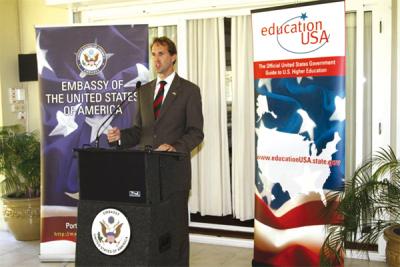Eleven years ago, former U.S. President Bill Clinton initiated the International Education Week (IEW) to recognize the value of international educational exchange in developing mutual understanding and respect around the world. An annual joint initiative of the U.S. Department of State and the U.S. Department of Education, the theme of this year’s IEW scheduled from November 14-18, 2011, is “International Education: Inspiring Students Locally to Succeed Globally.” It starts with the release of the annual “Open Doors Report”, a survey crafted by the U.S. Department of State in collaboration with the Institute of International Education, on international and U.S. student mobility.
The 2011 Report is extremely revealing and shows an increase in the number of students worldwide who pursue international education. In fact, whether it is an international student studying in the United States (up to 5% of the total) or an American Student studying overseas (up to 4%), students are more and more looking to international education as a gateway for their personal and professional growth.
About 30% of all current international students in the world are studying in the United States and that percentage includes the two hundred plus Mauritian students who are currently pursuing their higher studies in the U.S. Last July, I had the pleasure of sending off the Class of 2015; a dynamic group of 30 undergraduate and graduate Mauritian students. As of July of this year, undergraduate Mauritian students benefitted from over US$210,000 of financial assistance.
Furthermore, as I sent off the Class of 2015 off to such renowned American institutions as Brown University and Cornell University, I was pleased to meet members of ELI Africa, a non-governmental organization founded in the United States by a Mauritian Yale University alumnus, Vedant Seeam. This year, thanks to him and his fellow Yalies, a group of young people of Mont Goût in Pamplemousses had their first experience of “experiential” learning. This enterprise clearly demonstrates that international education is a key component of “smart power diplomacy”. It opens doors for young people to increase mutual understanding and bridge socio-economic, cultural, and geographic borders to engage in people-to-people connections in the classroom and communities worldwide.
America’s educational system is definitely unique and there are key factors that make U.S. education so popular: the U.S. higher education system has an international reputation for quality, no matter what kind of learning environment students seek, they will find ample choices from among the 3,600 diverse higher education institutions in the country, one of the hallmarks of U.S. education is flexibility where creativity, individualism and inclusiveness are valued and finally, campus life in U.S. universities is exceptional, meaning, a successful college experience involves more than academic work.
To quote Assistant Secretary for Educational and Cultural Affairs Ann Stock at a leadership meeting of NAFSA: Association of International Educators in Washington D.C. in January, “The great variety of our institutions’ size, focus, and educational philosophy means that there is a proper place for every student—a place where they can grow and succeed, where character and values are as important as knowledge and skills.”
I have no doubt that in the years to come, more and more Mauritian students will fly to the United States for their higher education studies. We know, in the words of Senator William Fulbright, that education is a powerful, if slow-moving, force.
And if I still did not convince you about the benefits of higher education in the United States of America, I invite you to call us on Tuesdays and Thursdays at 202 4444 and book a seat for one of our general advising sessions!
OP-ED — INTERNATIONAL EDUCATION: Inspiring Students Locally to Succeed Globally
- Publicité -
EN CONTINU ↻
- Publicité -


